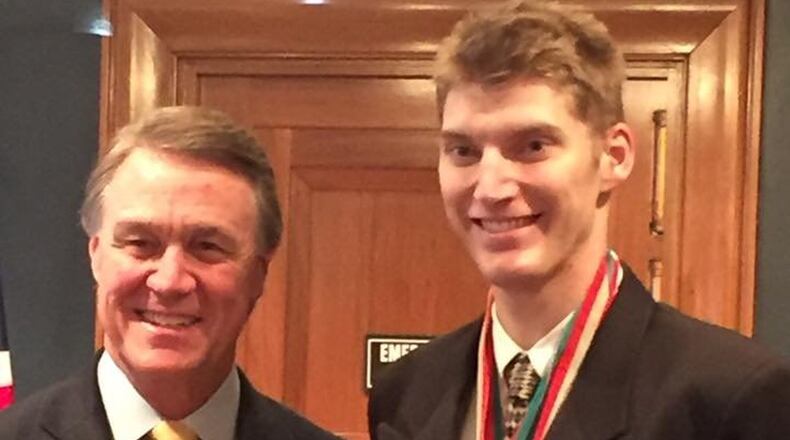If you were to focus on Michael Holland’s many challenges — autism, kidney disease, tic and seizure disorders, among them — you would miss his many, many strengths. The Douglasville resident is a committed athlete, having participated for 13 years in Special Olympics Georgia. Holland also is a global messenger for Special Olympics, advocating and building support for the organization and people with intellectual disabilities. Asked if others view him as an inspiration, the 21-year-old modestly answers, “I would say so.” The AJC caught up with Holland shortly after he returned from Washington, D.C., where he shared with lawmakers what Special Olympics has meant to him and people around the world and why our public officials need to continue to support it.
Q: Tell us about yourself. What do you like to do?
A: I enjoy doing puzzles, playing video games, watching TV and hanging out with my dog, Rex.
Q: And you enjoy Special Olympics, right?
A: I always have a blast. I do a lot of different sports — swimming, golf, basketball, basketball team skills, soccer, soccer skills, skiing, bowling. The team sports help me work with my team skills. I have friends to compete with and I also meet a lot of different people. There are the opening ceremonies and a dance. There is the Olympic Village, an area with crafts and games. They also do health screenings.
Q: Do you have a favorite sport?
A: I honestly don't.
Q: You’ve participated in Special Olympics Georgia. Do you ever see yourself participating in the USA Games, even the World Games?
A: I want to move up. I would like to travel the world.
Q: What did you do in Washington, D.C.?
A: I met with senators and congressmen, including Sen. David Perdue and Sen. Johnny Isakson. I asked them for their support for $4.5 million for the Special Olympics Healthy Athletes program. It offers free screenings and health exams for athletes. I also asked them to support $10 million for the Special Olympics Unified Schools program, which places students with disabilities and students without disabilities together in classes and sports.
Q: What did the lawmakers ask you?
A: What Special Olympics means to me. I told them it is like a home away from home for me. It teaches me a lot of different skills from the different sports. It helps make me more confident and independent.
Q: Didn’t you also have a chance to meet U.S. Secretary of Education Betsy DeVos?
A: She came and talked at a dinner for the Special Olympics athletes. I got to talk to her about my school, the Georgia Cyber Academy. I go to class online. If I miss class when I am at the Special Olympics, I can go back and watch the recording. I also can take my computer with me and log on wherever I am. There's a lot of freedom in it.
Q: What did you think of Washington, D.C.?
A: Very cool. We walked down the National Mall and I got to see the Washington Monument and the White House. It snowed the day we left.
Q: Why do you think people with disabilities should participate in Special Olympics?
A: It is hard to explain. I tried regular sports and that was scary. The people with Special Olympics want to help people get over their fears and I felt more comfortable. Special Olympics has given me a lot of opportunities. It is really fun. It's a time I can be myself. Everyone has different abilities. I don't see them with as people with a disability. I just see them as people.
Information on Special Olympics: www.specialolympics.org.
About the Author
The Latest
Featured

